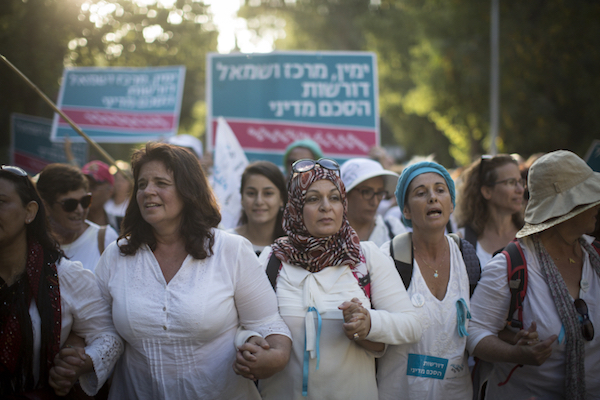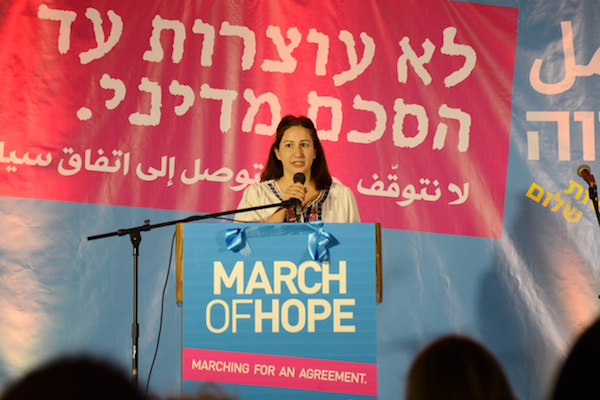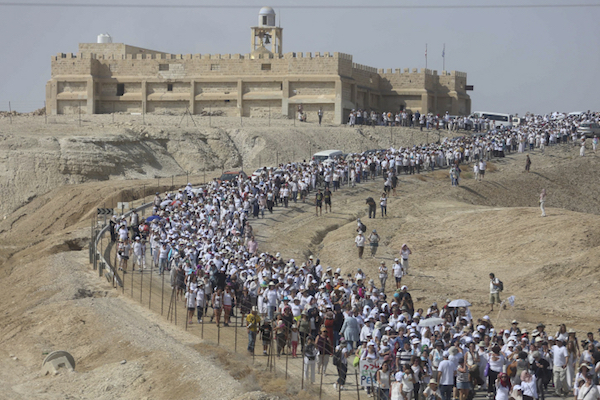How Thousands of Palestinian and Israeli Women Are Waging Peace
PALESTINE - ISRAEL, 31 Oct 2016
The thousands of Palestinian and Israeli women who marched in Jerusalem and Jericho this month are not only demanding peace from their societies, they are reaching through stereotypes and artificial boundaries to find true partners.

Thousands of women from ‘Women Wage Peace’ march on the Israeli Prime Minister’s Residence Jerusalem, October 19, 2016. (Hadas Parush/Flash90)
25 Oct 2016 – Less than a year ago a group of Palestinian and Israeli women spent a weekend in Tantur, situated between Jerusalem and Bethlehem, brainstorming what we could possibly do to break the cycle of violence and political stagnation. Everyone had their own personal reason for being there, whether it was the Israeli mothers who had to send their children to war or the Palestinian women who were exhausted by the daily incursions of the Israeli army, checkpoints, and the inability to live freely and imagine a hopeful future for their children. Personally, I felt torn apart having seen Jerusalem split into a hundred pieces, a place that should be the inspiration for coexistence instead oozing with the blood of Palestinians and Israelis on a near daily basis.
Over the last 11 years I have done my best to be involved in any possible initiative that attempts to bring about Israeli-Palestinian peace. Why is Women Wage Peace different? My belief has always been that if any group professes that they will bring about Israeli-Palestinian peace, they must have to want it so much so that they are willing to wed themselves to the cause. These women are of that character; they are unstoppable and determined but most of all, they believe they can create their own future. In order to create a different reality, we believe that we have to be that reality.
“We need to think outside of our surroundings,” Lily kept saying, and together we visualized the March of Hope, a march of togetherness — a cry to the whole world, coming from a mother’s womb, to stop the violence. We resolved not to stop, even in the midst of most terrible acts of violence. We met and shouted out, “ Enough! Enough!” in Arabic, Hebrew and English. We resolved to propose a shared language of hope, of humanity, of an unshakable commitment to peace, and we rejected the language of separation.

The author, Riman Barakat, addressing the Women Wage Peace rally at Neve Shalom/Wahat al-Salam, October 17, 2016. (Gili Getz)
When I stood in front more than 500 women at Neve Shalom/Wahat al-Salam earlier this month, I was not yet sure everyone truly understood or believed what was about to happen two days later — a joint march of thousands of Palestinian and Jewish women. As I called on the mostly Jewish group of women gathered there that day to come join hands with the Palestinian women, I felt the crowd cheering, moved by the thought of Palestinian partnership. Two days later, as the march commenced, a seemingly endless stream of Palestinian women descended from bus after bus, from Nablus, Hebron, East Jerusalem, Jericho, Jenin, Bethlehem. And mind you, they were there to really participate, and participate the did, singing out the words of peace.
We need to allow ourselves to bring down the barriers within and without, to dare to look each other in the eye and see the humanity. A long time has passed with us here and them there. The first step is to breach that psychological barrier and allow ourselves to be welcomed by those we call the “other.” I can’t recall the last time so many Israelis and Palestinians met and walked together. I believe I was much younger then, during the Oslo Accords. Yet after more than 20 years of separation, thousands of women are once again uniting for a common cause. It is a historic moment, and even those who try to ignore it will find it harder and harder to do so as it continues to grow.

Thousands of Palestinian and Israeli women from ‘Women Wage Peace’ march near the West Bank city of Jericho, October 19, 2016. (Flash90)
When my dear friend Huda Abuarqoub from Hebron stood on the podium at the end of the march outside the Prime Minister’s Residence in Jerusalem, declaring loudly, bravely and clearly, “Enough with the myth, I promise you, you have a partner,” it almost felt like a dream, like we were on a different planet. I watched the shock and elation of my Israeli friends. It was as if Huda herself was from another planet. But she was real, here, in the flesh, loud and clear. And everyone saw the magic that morning, only it wasn’t magic. There is a partner and the partner is real. It’s time to stop constantly demanding proof.
Nobel Laureate Leymah Gbowye, who came from Liberia to join us in our march, invited the audience to take part in what she called “the open mind challenge,” picking up on what I said earlier in my speech about seeing the humanity of the other. She told us a story from her childhood about an old woman who lived on top of a hill in the forest, whom everyone thought was a witch who ate little children. Leymah’s grandmother insisted on taking the children to visit her. What was the point? The moral of Leymah’s story is that we need to cross those borders within ourselves, to deconstruct the stereotypes we’ve built about each other — an accumulation of many “thin walls,” as she called them. All it takes is one simple act of courage to traverse a border or boundary of fear, to challenge ourselves, and dare to truly meet the other.
What we witnessed on October 19 was an unsurprising surprise, that yes, those on the other side are human beings, full of love, who also want life and peace. Yet there we were, all of us aghast, my Israeli friends and I, as we listened to Huda stating nothing but the obvious. The myth of the evil witch on the top of the hill was shattered right then and there, and the partner for peace was among us, present in every shape and form.
____________________________________
Riman Barakat is a Palestinian peace activist, the CEO and founder of Experience Palestine for International Missions and Delegations, and a board member of ALLMEP (The Alliance for Middle East Peace). Previously she was co-director of IPCRI (Israel Palestine Creative Regional Initiatives) as well as he Palestinian executive director for Breaking the Impasse.
Join the BDS-BOYCOTT, DIVESTMENT, SANCTIONS campaign to protest the Israeli barbaric siege of Gaza, illegal occupation of the Palestine nation’s territory, the apartheid wall, its inhuman and degrading treatment of the Palestinian people, and the more than 7,000 Palestinian men, women, elderly and children arbitrarily locked up in Israeli prisons.
DON’T BUY PRODUCTS WHOSE BARCODE STARTS WITH 729, which indicates that it is produced in Israel. DO YOUR PART! MAKE A DIFFERENCE!
7 2 9: BOYCOTT FOR JUSTICE!
DISCLAIMER: The statements, views and opinions expressed in pieces republished here are solely those of the authors and do not necessarily represent those of TMS. In accordance with title 17 U.S.C. section 107, this material is distributed without profit to those who have expressed a prior interest in receiving the included information for research and educational purposes. TMS has no affiliation whatsoever with the originator of this article nor is TMS endorsed or sponsored by the originator. “GO TO ORIGINAL” links are provided as a convenience to our readers and allow for verification of authenticity. However, as originating pages are often updated by their originating host sites, the versions posted may not match the versions our readers view when clicking the “GO TO ORIGINAL” links. This site contains copyrighted material the use of which has not always been specifically authorized by the copyright owner. We are making such material available in our efforts to advance understanding of environmental, political, human rights, economic, democracy, scientific, and social justice issues, etc. We believe this constitutes a ‘fair use’ of any such copyrighted material as provided for in section 107 of the US Copyright Law. In accordance with Title 17 U.S.C. Section 107, the material on this site is distributed without profit to those who have expressed a prior interest in receiving the included information for research and educational purposes. For more information go to: http://www.law.cornell.edu/uscode/17/107.shtml. If you wish to use copyrighted material from this site for purposes of your own that go beyond ‘fair use’, you must obtain permission from the copyright owner.
Read more
Click here to go to the current weekly digest or pick another article:
PALESTINE - ISRAEL: